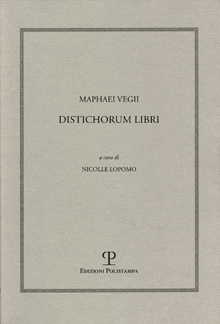Ricerca Veloce
Ricerca Avanzata
Maphaei Vegii
Figlio di Belloria Vegio e di Caterina de Lanteri, “et
generis antiquitate clarissimi et virtute spectabiles”, Maffeo Vegio compie i
primi studi di retorica a Milano dove nel 1418 assiste ad una predica di Bernardino
da Siena, rimanendo colpito dalla grandiosa eloquenza e dalla semplicità
evangelica del santo.
Tra il 1421 e il 1423 Vegio intraprende gli studi di giurisprudenza presso lo Studium
di Pavia ed entra in contatto con i protagonisti dell’Umanesimo di primo
Quattrocento tra cui Antonio Beccadelli, detto il Panormita, Pier Candido
Decembrio e Lorenzo Valla, che lo scelse come protagonista del suo dialogo De vero bono.
Nel 1435 si trova al servizio del vescovo di Traù Ludovico Trevisan, tramite il
quale si avvicina a papa Eugenio IV. Al seguito della curia romana, l’umanista
lodigiano assiste agli eventi del Concilio di Firenze (1439) e, con il favore
del pontefice, inizia il suo cursus honorum curiale: abbreviatore apostolico e
datario (1441), dal 1443 egli ottiene il canonicato presso la basilica di San
Pietro in Vaticano.
A Roma l’umanesimo letterario del Vegio si rinnova al contatto con personalità
quali Enea Silvio Piccolomini, per poi declinarsi in chiave religiosa grazie ad
un rinnovamento di fede che lo avvicinerà sempre di più al pensiero di Sant’Agostino,
nei confronti del quale manifesta una profonda devozione pur non vestendo mai l’abito
dell’ordine.
Alla sua morte il Vegio è sepolto nella Basilica di Sant’Agostino a Roma.
Maffeo
Vegio (Latin: Maphaeus Vegius) (1407-1458) was an Italian poet who wrote in Latin;
he is regarded by many as the finest Latin poet of the fifteenth century.
Born near Lodi, he studied at the University of Pavia, and went on to write
some fifty works of both prose and poetry.
His greatest reputation came as the writer of brief epics, the most famous of
which was his continuation of Virgil’s Aeneid,
known variously as the Supplementum (Supplement) or Aeneidos Liber XIII (Book 13 of the Aeneid). Completed in 1428, this 600-line poem starts immediately
after the end of Virgil’s epic, and describes Aeneas’s marriage to Lavinia and
his eventual deification. Its combination of classical learning and piety made
it very popular in its day; it was often included in editions of the Aeneid in the fifteenth and
sixteenth-centuries. An electronic text can be found at the Latin Library.
Vegio also wrote an epic Astyanax(1430),
on the death of the son of Hector, prince of Troy, and a four-book epic Vellus Aureum (the Golden Fleece) (1431). During 1436–37 he completed his epic on the
life of the Christian Saint Anthony, the Antoniad.
Michael C. J. Putnam edited and translated Vegio’s Short Epics for the I Tatti
Renaissance Library (Harvard University Press).
Vegio flattered his way into the papal court, and was made canon of St. Peter’s
Basilica in 1443; it was an office he held until his death in 1458.
Some of Vegio’s poems were later set as motets by Renaissance composers – an
example being Huc me sidereo, set by
Josquin, Jacobus Vaet, Orlando Di Lasso and the first motet of Adrian Willaert’s
1559 Musica Nova collection.
Libri scritti da Maphaei Vegii
Distichorum libri
- € 23,75
- € 25,00
